Introduction
This is not the first time people have had to deal with a pandemic like this. Before Covid-19, human society has had to deal with a variety of epidemics, including smallpox, Ebola, Spanish flu, cholera, dengue fever, and chikungunya, among others. The novel coronavirus disease (COVID-19) pandemic has brought the entire world to a halt, resulting in major human and economic losses. Covid-19 is a highly pathogenic virus that has claimed the lives of millions of people. In late December 2019 there was a cluster of pneumonia cases with unknown etiology detected in the city of Wuhan, in the south of China and shortly after causative agent was identified as SARS-CoV-2 (severe acute respiratory syndrome coronavirus-2). Some of the early cases had reported visiting or working in a sea food and live animal market in Wuhan. Investigation was found that the disease was caused by newly discovered corona virus. The disease was subsequently named corona virus disease 2019 (Covid-19). That spread quickly within china and to the all corner to the world. On 11 February 2020, the World Health Organization (WHO) declared this a new disease of a public health emergency of international concern. It is believed that SARS-CoV-2 actually had the ability to hop over from a Bat. From bat this CoV-2 underwent a mutation via zoonosis and have ability to infect human and cause Covid-19. This virus is potentially spread through the faecal-oral route and respiratory droplet and finally enter into the lungs and with the help of S-spike protein attached to Type 2 pneumocyte and bind with specific receptor (Angiotensin converting enzyme) and effect respiratory system. Veterinarians play an important role in the health management of animals, including livestock, pets, and wild. Veterinarians also contribute to a growing nation’s economy by increasing animal development through disease control and management. During the pandemic, veterinarians were kept to the same standards as human doctors. Veterinary doctors had to strike a balance between their personal lives, families, human well-being and the welfare of their patients. The Veterinarians have demonstrated their contribution to supporting the work of human health authorities in a number of countries.
Covid-19 diagnosis
Veterinary medicine profession has always been an important part of public health. Aside from collaborative research, the animal health sector, especially Veterinary Services, helps to create a popular response to the pandemic in a variety of ways. Veterinary laboratories have used their experience and expertise in infectious disease high throughput research to participate in activities such as surveillance screening by testing human samples, thus assisting human health systems with their diagnostic capability. The World Organisation for Animal Health (OIE) issued guidelines on 15 April 2020, stating that veterinary laboratory staff have the expertise and experience to assist public health agencies in meeting the increase in demand for Covid19 diagnostic testing in humans. During the pandemic, veterinary institutes including Indian Veterinary Research Institute (IVRI), Izatnagar, Bareilly and other diagnostic laboratories engaged in the Covid-19 test in humans and animals. According to reports, the institute diagnoses more than 20,000 human samples per day at a rate of 300 samples per day.
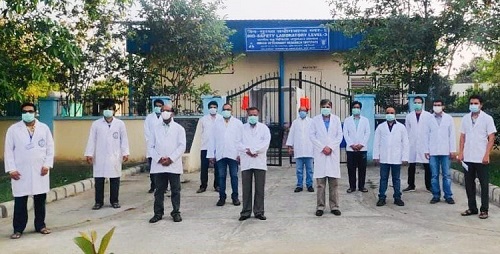
Support public and environment health
Veterinary medical profession have long played an important role in public health. The veterinary profession has become an effective defense tool for animal and human health through veterinary research, the effort to control parasites, or the documentation of possible zoonosis. Aside from collaborative research, the animal health industry, especially Veterinary Services, helps to organise a pandemic response in a variety of ways. Veterinarians from a number of countries have shown an interest in assisting human health organisations in their efforts. Veterinary laboratories have used their skills and experience in infectious disease high throughput research capability to assist human health systems in their diagnostic capacity by participating in activities such as surveillance screening by analyzing individual samples. They also supervise the treatment of laboratory animals, which are essential for the development of medicines and vaccines, including COVID-19 vaccine testing. Veterinary doctors and researchers in India and other countries have been assisting public health authorities in monitoring the disease in humans and assisting in the implementation of successful public health strategies. Veterinary Services activities, in addition to the disaster response initiative, contribute to meeting vital needs that are severely hampered in the current situation. Food protection, animal welfare, and livelihoods are all inextricably related to sound animal production systems. Veterinary Services must continue their multiple activities in order to ensure a reliable supply of nutritious food for communities and their long-term survival. The economic, animal health, and food security consequences of COVID-19 are as urgent as ever. Veterinary expertise in toxicology, epidemiology, and ecology are vital to efforts to understand, control, prevent, diagnose, and treat environment-associated diseases that affect both people and animals.
Role of Veterinarians in a disease control programme
Another response from the veterinary community is to introduce appropriate risk control policies to prevent SARS-CoV-2 transmission between humans and vulnerable animals. It’s also essential to keep an eye out for SARS-CoV-2 infection in sensitive animals like mink and racoon dogs, as well as humans that come into contact with them. Active monitoring is recommended because early infections in these animals, especially mink, can be difficult to detect. By implementing effective risk management measures to prevent the transmission of SARS-CoV-2 between humans and susceptible animals, veterinary services are play important role in protect animal health, and thus public health. According to the World Organisation for Animal Health, 60% of pathogens that cause disease in humans come from animals including avian influenza, Ebola, and swine flu. Veterinarians also play an important role in disease control and prevention by spreading vaccination policies that protect the lives of both animals and humans. Vaccination would almost certainly be part of a multi-faceted public health strategy to the emergence of a pandemic disease in the future. In addition to other pandemic preparedness and control initiatives including monitoring, communication plans, quarantine, and disease treatment, the implementation of effective vaccines has the potential to save lives and reduce disease spread. For the successful vaccination programme needs proper activeness and proper monitoring.
Stray Animals and Covid-19
As coronavirus forces billions of people around the world into lockdown, another sizable population had also been through hard. During the lockdown, more people remained at home, restaurants and most markets were closed. During the scorching summer, stray animals around the country are suffering from a lack of food and water. Dogs cats who do not have dedicated feeders suffer because the processing of garbage from restaurants has ceased, and meat shops, which were their favourite hangout spots, have closed. Not only stray dogs, the nationwide lockdown has hit all kinds of stray animals like cattle and birds. Almost all of the stray animals’ vital food sources were missing. The effect on stray animals was devastating, as the majority of them were unable to find food. In that situation veterinarian team and NGOs regular tried to searching day and night and providing them with shelter and food as well as a new lifeline. Veterinarians also assisted sick and wounded animals with ongoing veterinary treatment and supervision, as well as surgical and emergency services. During lockdown many people have lost their job. Many owner could not afford treatment. Veterinary professionals have demonstrated their compassion by providing effective care to stray animals and sharing knowledge about first-aid treatment and disease prevention in animals through social media.
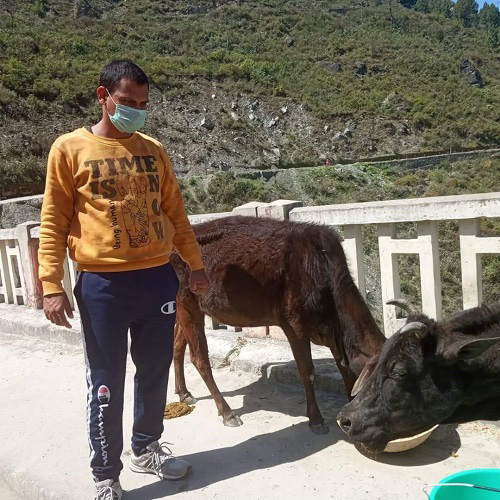
World food security
In addition to crisis management efforts, it should not be ignored that Veterinary Services activities contribute on a daily basis to addressing vital needs that are severely hampered in the current situation like food security and protection, as well as livelihoods, are inextricably linked to sound animal production systems. The COVID-19 pandemic poses a threat to the domestic and global food supply. COVID-19 outbreaks in a few manufacturing plants have placed a strain on critical food supplies, stocks, and processing. Farmers have been forced to destroy crops and animal products because of a shortage of employment and a fall in restaurant demand. Basic infrastructure fails, putting food safety and security at risk. As a result, animal protein could be in short supply to satisfy demand. Veterinary Services must continue to carry out their numerous operations that lead to ensuring a continuous supply of nutritious food for populations, such as timely vaccination and deworming of food animals, in order to ensure their survival.
Veterinary Solidarity with medical profession
In most nations, veterinarians are supporting our human medical colleagues. Although human resources were in short supply, number of colleges and laboratories have also donated life-saving devices and clinical materials including personal protective equipment, ventilators, stethoscope, thermometer, disposable gloves/ syringe, masks, gowns and some medicine and other protective gear to hospitals. In several countries, the veterinary profession has stockpiled essential medical equipment such as respirators. In several countries, veterinary institutes and laboratories are assisting in the production of COVID samples. Medical instruments and safety equipment are manufactured by the animal health industry. Many veterinarians serve as leaders of COVID task forces in their respective countries and work together in a One Health approach. According to the American veterinary medical association (AVMA), “veterinarians play a significant role in One Wellbeing because animals both influence and are influenced by humans and the environment.” The AVMA is dedicated to providing accurate, up-to-date information and tools to assist the veterinary community in providing care during the pandemic. This work involves caring for dogs, horses, livestock including ensuring the nation’s food supply, research animals, marine, exotic, and wild animals, all of which are essential and contribute to the protection of both animal and human health.
Veterinarians and One health
The term One Health refers to a method of developing and implementing programmes, policies, legislation, and studies in which various sectors communicate and collaborate to improve public health outcomes. Food protection, zoonotic disease prevention, and antibiotic resistance are some of the areas where a One Health approach is especially useful. The One Health philosophy addresses the interconnectedness of human, animal, and environmental health while also facilitating cross-sector collaboration. Veterinarians are constantly at the forefront of One Health campaigns, seeking to gain a place at the table in joint efforts. Since animals both affect and are affected by people and the environment, veterinarians play a critical role in One Health. Veterinarians are critical to the advancement of One Health and the protection of its three pillars: animals, humans, and the environment, whether as healthcare practitioners, epidemiologists, or ecological experts. This form of action would allow for the early detection of potential pathogens and the creation of strategies to prevent pathogens from spreading freely and repeatedly among primary hosts and becoming highly infectious to humans. Many of us might not be aware that Pfizer Pharmaceuticals’ COVID-19 vaccine was created under the direction of Pfizer COE Dr. Albert Bourla, a veterinarian. This is a true reflection of veterinarians’ critical position in public health, and it emphasizes the importance of One Health once more.
Conclusions
The corona pandemic is an opportunity for veterinarians to shine. Veterinary medicine profession has always been a vital component of public health. The profession must encourage creativity and leadership in order to increase its social significance. Veterinarians will assert themselves as key players in turning One Health theory into collaborative action by focusing on food conservation, navigating the COVID-19 pandemic, and preventing future pandemics. The profession must maintain its efforts to recruit a diverse professional workforce in order to maximize its contribution to society.

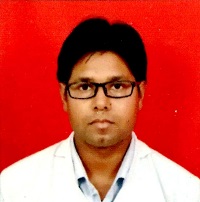

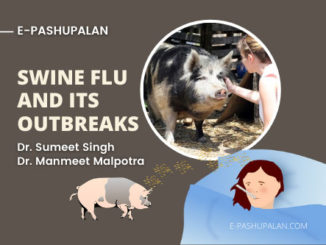
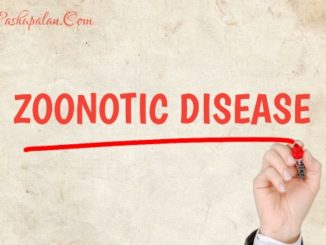
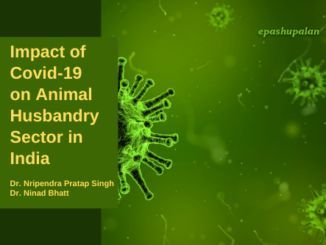

Be the first to comment